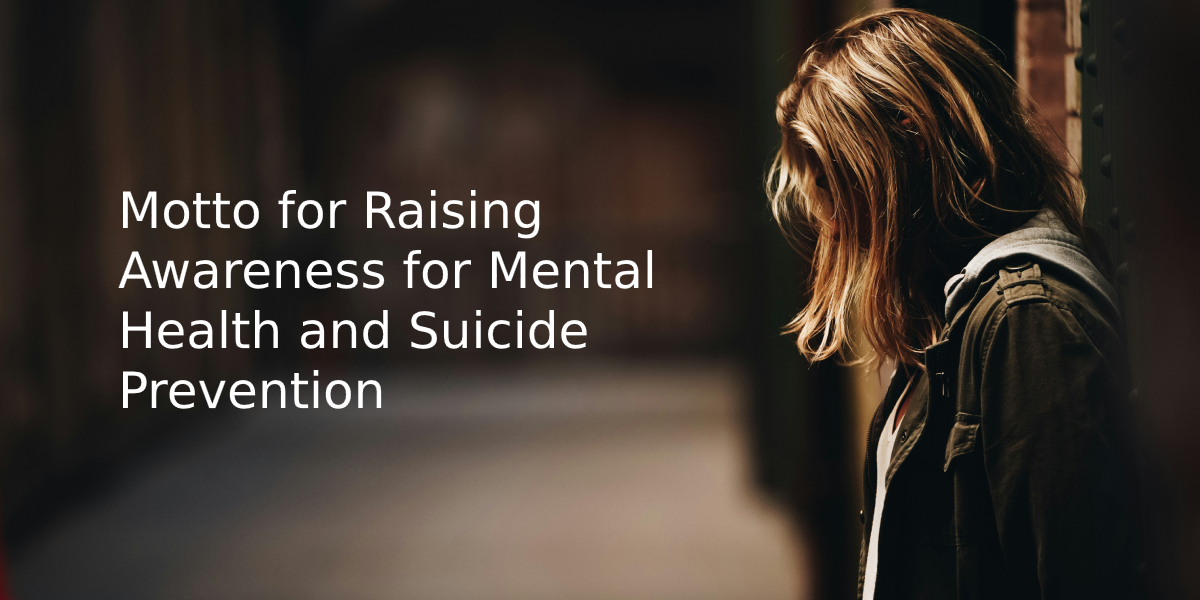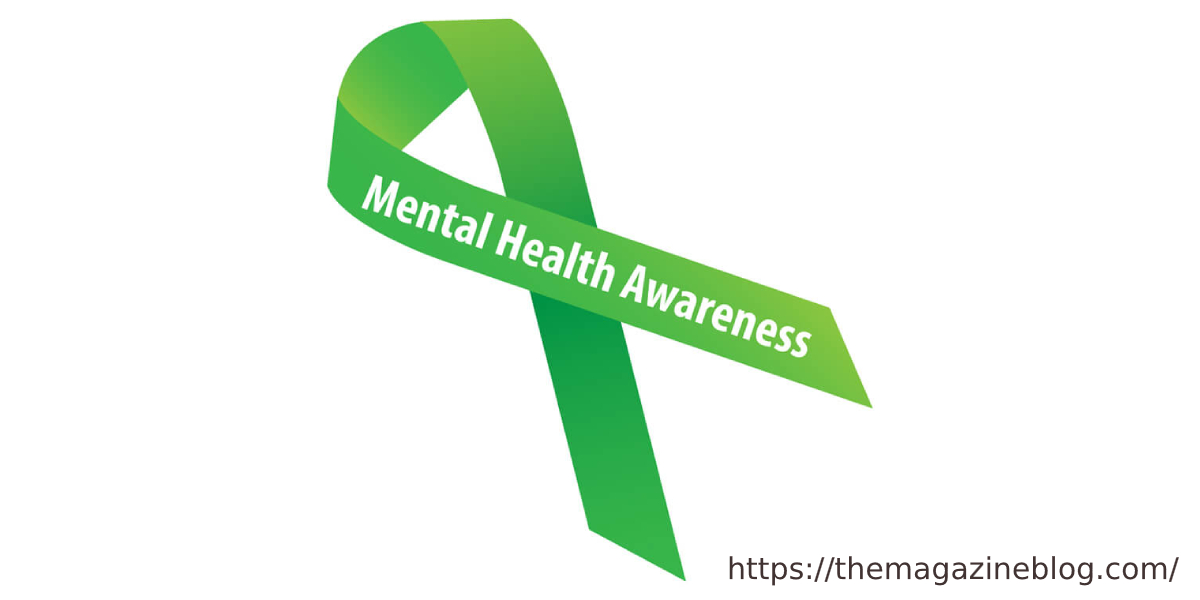Uncategorized
The //vital-mag.net Blog: Your Gateway to Wellness and Lifestyle

Uncategorized
Motto for Raising Awareness for Mental Health and Suicide Prevention

In today’s world, where societal challenges are more complex than ever, the importance of raising awareness for mental health and suicide prevention has become a crucial focus for communities, organizations, and individuals alike. Despite the remarkable strides made in de-stigmatizing mental health issues, many people still suffer in silence, unaware of the support systems that exist or too afraid to seek help due to societal misconceptions. One powerful way to spark change is through a motto for raising awareness for mental health and suicide prevention. A clear and compelling motto can help shift perceptions, foster understanding, and encourage action at both personal and societal levels.
The mental health crisis is not something that can be solved overnight, but with sustained effort and advocacy, significant progress can be made. It requires a collective mindset shift, and the use of mottos can play a pivotal role in achieving this change. Mottos are simple but impactful phrases that serve as rallying cries, unifying people under a common cause. By creating a clear message that can resonate with people, these mottos can contribute to removing the stigma around mental health issues and provide those in need with a sense of hope, support, and a pathway to recovery.
Understanding the Mental Health Crisis
Before we delve deeper into the importance of having a motto for raising awareness for mental health and suicide prevention, it’s essential to understand the scale of the mental health crisis. Mental health disorders affect millions of people worldwide, transcending age, gender, race, and socioeconomic background. According to the World Health Organization (WHO), approximately one in four people will be affected by a mental or neurological disorder at some point in their lives. In addition, suicide is one of the leading causes of death globally, with nearly 800,000 people taking their lives every year, representing one person every 40 seconds.
These staggering statistics highlight the urgency of raising awareness and taking action. Mental health and suicide are not topics to be whispered about in hushed tones. They deserve open discussion and advocacy. Mottos aimed at raising awareness for mental health and suicide prevention can help create a foundation of trust, solidarity, and education to break the silence and encourage people to seek the help they need.
The Role of Motto for Raising Awareness for Mental Health and Suicide Prevention

A motto for raising awareness for mental health and suicide prevention serves several purposes. It can be used to:
- Combat Stigma: For too long, mental health issues have been viewed through a lens of shame and judgment. A powerful motto can help challenge these misconceptions, offering a new narrative that encourages acceptance and understanding.
- Encourage Help-Seeking Behavior: One of the major barriers to addressing mental health issues is the fear of seeking help. People who are struggling may worry about being labeled or misunderstood. A well-crafted motto can send a message that it is okay to ask for help and that support is available.
- Foster Community Support: A strong motto has the potential to unite individuals, families, and communities in support of those dealing with mental health challenges. It creates a sense of shared responsibility and solidarity in the fight against mental health issues and suicide.
- Raise Public Awareness: Mottos can be used in media campaigns, social media posts, posters, and other public platforms to increase visibility around the topic of mental health. The more people understand mental health and suicide prevention, the more likely they are to recognize warning signs, offer support, and act in ways that prevent unnecessary loss of life.
- Promote Long-Term Change: A motto can serve as a lasting symbol for a cause, encouraging ongoing dialogue and policy changes aimed at improving mental health care, suicide prevention programs, and support systems.
Crafting a Strong Motto for Mental Health Awareness
Creating an effective motto for raising awareness for mental health and suicide prevention requires careful thought and consideration. A successful motto should be short, simple, and easy to remember while conveying a clear message. Here are a few key factors to keep in mind when crafting a motto:
1.Clarity and Brevity
A motto should be clear and direct, offering a concise message that people can easily understand and recall. The best mottos often capture the essence of a cause in just a few words. For example, a motto like “You Are Not Alone” effectively conveys the message that individuals struggling with mental health issues and suicidal thoughts are supported and not isolated in their pain.
2.Inclusivity
Mental health affects people from all walks of life, and a successful motto must reflect this universal experience. It should speak to all people, regardless of their background, and convey a message of hope and unity. A motto like “Together for Mental Health” reinforces the idea that everyone—whether directly affected or not—has a role to play in advocating for mental health awareness and suicide prevention.
3.Positive Messaging
Although mental health and suicide prevention are serious topics, a successful motto should focus on positivity and hope. Words that evoke optimism, healing, and support can empower individuals facing mental health struggles. Mottos like “Hope Starts Here” or “Healing is Possible” can inspire people to take the first step toward recovery.
4.Action-Oriented
Mottos that encourage action are particularly effective in raising awareness and mobilizing people to take tangible steps toward addressing mental health issues. “Speak Up, Reach Out” and “Act Now, Save Lives” are examples of action-oriented mottos that not only raise awareness but also motivate individuals to engage in conversations or seek help when needed.
5.Empathy
An effective motto should express empathy, compassion, and understanding. This can help reduce the feelings of shame that often accompany mental health struggles. Phrases like “We Listen, We Care” or “You Matter” can provide reassurance and demonstrate that help is available and that others are willing to offer support without judgment.
The Power of Mottos in Campaigns and Social Movements
A motto for raising awareness for mental health and suicide prevention can have a powerful impact when integrated into larger advocacy campaigns. Whether through grassroots efforts, national awareness months, or digital media campaigns, the right motto can serve as a rallying cry that encourages people to take action.
For example, during National Suicide Prevention Month, slogans such as “Be the Voice, Save a Life” or “Every Life is Worth Living” can be featured across social media platforms, on billboards, and in educational materials to highlight the importance of mental health and suicide prevention. These messages can not only reduce stigma but also educate people on the resources and support systems that are available to those in need.
Inspiring Examples of Mottos in Mental Health and Suicide Prevention
Over the years, many impactful mottos have emerged in the field of mental health and suicide prevention. Some of these include:
- “End the Stigma”: A call to end the societal stigma that often accompanies mental health challenges, urging people to speak out and seek help without fear of judgment.
- “It’s Okay to Not Be Okay”: A message that acknowledges the reality of mental health struggles and encourages individuals to be open about their feelings without shame or fear.
- “Take a Step, Save a Life”: This motto encourages people to take action—whether it’s reaching out to a loved one, getting involved in a mental health campaign, or seeking support for themselves.
- “Small Steps, Big Change”: This motto emphasizes that even small actions can have a significant impact, whether it’s talking about mental health or making small changes to improve one’s own well-being.
- “Hope is Real”: A simple but powerful motto that reinforces the idea that recovery is possible, offering a sense of hope to those in the midst of crisis.
The Future of Mental Health Advocacy
As society continues to evolve, so too should our approach to mental health awareness and suicide prevention. With the help of effective mottos, campaigns, and advocacy efforts, we can continue to make progress in reducing the stigma around mental health and creating an environment where people feel supported and empowered to seek help.
A motto for raising awareness for mental health and suicide prevention has the potential to spark lasting change. It can remind people that mental health is as important as physical health and that everyone deserves to live a life free from the burden of silence, shame, and suffering.
Conclusion
In conclusion, the power of a motto for raising awareness for mental health and suicide prevention cannot be underestimated. It can unite individuals, organizations, and communities in the fight to reduce stigma, promote open dialogue, and ensure that mental health support is accessible to all. Through impactful mottos, we can inspire change, save lives, and create a world where mental health is no longer an afterthought but a priority for everyone.
By continuing to spread messages of hope, support, and understanding, we can build a future where mental health challenges are met with empathy, resources, and a commitment to helping those who need it most.
Uncategorized
Why is Music Important? Exploring the Power and Impact of Music

Music is everywhere, and its influence on our lives is undeniable. It has the ability to evoke emotions, inspire creativity, and connect people across cultures. But why exactly is music so important? Let’s dive into the various ways mu sic affects our minds, bodies, and souls, and explore the reasons behind its universal significance.
Emotional Expression and Healing
Music allows us to express emotions that words often fail to capture. Whether it’s joy, sadness, anger, or nostalgia, music has the power to bring our feelings to the surface. When we listen to a piece of music that resonates with our mood, it feels as if the artist has given voice to what we’re experiencing. This emotional connection can be incredibly therapeutic. Many people turn to music as a form of emotional release, helping them process feelings in ways that talking or writing might not.
Music as a Universal Language
One of the most unique qualities of music is that it transcends linguistic and cultural boundaries. A song can be understood, appreciated, and felt by people from different countries, regardless of whether they understand the lyrics. Music’s ability to communicate emotions without the need for words makes it a universal language that connects people on a deeper level.
Cognitive Benefits of Music
Research has shown that music has a profound effect on brain function. Listening to or playing music can improve memory, enhance concentration, and even boost problem-solving skills. For children, exposure to music early in life has been linked to better cognitive development. In adults, listening to music can stimulate brain activity and help slow cognitive decline in older age.
Musics and Creativity
Music plays a critical role in sparking creativity. Whether you’re a musician or a listener, musics encourages imagination and creative thinking. The way musics combines rhythms, melodies, and harmonies often serves as an inspiration for writers, artists, and thinkers. It can transport the mind to a different place, allowing it to explore new ideas and possibilities.
Musics and Mental Health
Music has been recognized as a valuable tool in mental health therapy. Musics therapy is an established practice used to help individuals with various mental health conditions, including depression, anxiety, and PTSD. The rhythmic and repetitive nature of musics helps in reducing stress, lowering anxiety, and promoting relaxation. Some studies have also shown that certain types of music, like classical or meditative tunes, can lower cortisol levels, leading to reduced stress.
Social Connection Through Music
Music is often at the heart of social gatherings and communal activities. Concerts, festivals, and events are where people come together to enjoy shared musical experiences. Whether it’s singing along to a popular song, dancing at a party, or performing in a choir, mus ic fosters a sense of community and belonging. It bridges gaps between people, creating bonds that might not otherwise exist.
Cultural Significance of Music
Music is a crucial element of cultural identity. Every culture has its own unique sound, instruments, and musical traditions that reflect its history, values, and beliefs. From African drumming circles to Indian classical ragas, mus ic has always played a role in preserving cultural heritage. It serves as a form of storytelling, passing down traditions and historical events from generation to generation.
Mus ic and Physical Health
The effects of mu sic extend beyond mental and emotional well-being; it also has a notable impact on physical health. Studies have demonstrated that mu sic can help manage pain, improve sleep, and enhance physical performance. For example, many athletes use mu sic to get into the zone before a game or to maintain focus during training. Fast-paced, upbeat mus ic is known to boost endurance and motivation, making it a popular tool for enhancing workouts.
Educational Impact of Music
Music has been shown to improve academic performance in children and young adults. Learning to play an instrument, for example, enhances fine motor skills, hand-eye coordination, and concentration. Mu sic education encourages discipline, patience, and perseverance, which are skills that can be transferred to other areas of life. Additionally, students who engage with mu sic are often more engaged in school and show higher levels of creativity and critical thinking.
Historical Influence of Music
Music has played an important role throughout history, from influencing social movements to reflecting the cultural and political climate of different eras. Songs of protest, for instance, have been central to movements for social change, providing a voice for the voiceless and a rallying cry for justice. From the civil rights anthems of the 1960s to today’s hip-hop and pop songs addressing issues like inequality and climate change, mu sic continues to inspire and drive societal progress.
Music as a Form of Entertainment
Entertainment is one of the most obvious roles of music. Whether through live performances, recorded tracks, or background mus ic in films and games, mu sic enhances our entertainment experience. The emotional responses it evokes can amplify the enjoyment we feel during these activities, making mu sic an essential part of the entertainment industry.
Influence of Musics on Fashion and Lifestyle
Music often sets trends in fashion and lifestyle. From the punk rock aesthetic to hip-hop’s influence on streetwear, different mu sic genres create subcultures that inspire the way people dress, speak, and interact. These musical movements shape the cultural landscape and define entire generations.
The Role of Musics in Rituals and Celebrations
Music is an integral part of religious rituals, ceremonies, and celebrations. It is used to mark important life events such as weddings, funerals, and festivals. The emotional and spiritual qualities of mu sic make it a powerful tool in creating a sacred atmosphere and connecting people with their faith or shared values.
The Therapeutic Role of Mu sic in Recovery
Music therapy is often used in hospitals and rehabilitation centers to aid in the healing process. For patients recovering from surgery or dealing with chronic illness, mu sic can help reduce pain perception, promote relaxation, and improve mood. The calming effects of mu sic make it an important therapeutic tool in healthcare.
Music and Personal Identity
For many, mu sic is a reflection of personal identity. The songs we listen to, the artists we follow, and the genres we enjoy often say something about who we are as individuals. Musi c can represent our values, our emotions, and even our personal history. It’s a medium through which we explore and express our own identity, making it a deeply personal experience.
Conclusion
Music holds an essential place in our lives for its ability to influence our emotions, connect us with others, and enhance our well-being. From its mental health benefits to its role in social and cultural contexts, musi c plays a powerful and multifaceted role in human life. Whether we use it for entertainment, healing, or self-expression, mus ic is a universal force that will always be significant.
FAQs
How does music affect mental health?
Music can reduce stress, alleviate anxiety, and improve mood, making it beneficial for mental health.
Why is mus ic considered a universal language?
Music transcends language barriers by conveying emotions and stories without needing words.
Can mus ic improve cognitive function?
Yes, studies show that mus ic can enhance memory, concentration, and problem-solving skills.
How does mus ic impact cultural identity?
Music reflects cultural history and traditions, helping to preserve and communicate cultural identity.
What is the role of mu sic in education?
Music enhances creativity, discipline, and critical thinking skills, positively impacting academic performance.
















